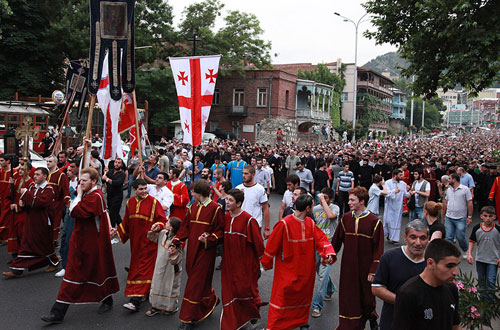| Georgian Orthodox Church Softens Stance |
| Civil Georgia, Tbilisi / 11 Jul.'11 / 21:49 |

The Georgian Church-led protest demonstration in Tbilisi on July 9. Photo: Guram Muradov/Civil.ge
The Georgian Orthodox Church has toned down rhetoric over legislative amendment on religious minorities’ legal status and after two days of protest marches called on believers to show calm.
A written statement by the Holy Synod, the Georgian Church’s main decision-making body, released after its meeting on July 11, reiterates the Patriarchate’s dissatisfaction that the legislative amendment was passed hastily without proper consultations with the Georgian Orthodox Church.
The decision, however, does not contain any calls for revoking the legislative amendment or wording like “dangerous” and “contravening the interests of Church and state”, used by the Georgian Orthodox Church previously in reference to those legislative amendments.
“Despite of reasons for anxiety, the Holy Synod calls on the clergy and parish to keep calm and to refrain from any actions on their own initiative, as well as to intensify praying for the unity of the nation and for peace,” the decision reads.
While again expressing dissatisfaction that the decision was taken without thorough consultations with the Church, the Holy Synod called on the authorities: “In the future, when religion-related draft laws or similar issues [emerge], hold consultations with the Georgian Patriarchate beforehand in order to avoid any possible complications taking in the view that the issue is delicate.”
After the meeting of Holy Synod, senior clerics from the Georgian Church were saying that decisions had been taken based on “mutual compromise” without going further into details. It has also emerged that a ruling party lawmaker, Lasha Tordia, met with the Patriarchate officials before the Synod released its decision.
“The mutual compromise means, that decision was taken through agreement. Such a decision will be taken, which will contribute positively to both the Church and the state,” Metropolitan Iobi of Urbnisi and Ruisi told journalists after the Synod meeting.
Archbishop Seraphim of Borjomi and Bakuriani said after the Synod meeting that MP Tordia, chairman of the parliamentary committee for human rights assured Synod members that the legislative amendment on legal status of religious minorities was not affecting negatively on special status of the Georgian Orthodox Church envisaged by the Georgian Constitution and a concordat signed with the state in 2002.
Archbishop Seraphim said that main source of concern had been a question whether the recent legislative amendment was giving the same rights, which the Georgian Church enjoys, to other religious groups.
“MP Lasha Tordia told the Synod, that the authorities were taking responsibility, that with this law the government was not granting the rights, similar to those of the Georgian Orthodox Church, to other religious groups,” Archbishop Seraphim said.
The written decision of the Holy Synod says that “every religious group in Georgia is equal before the law… and the Georgian Orthodox Church’s special legal status, defined by the constitution and the constitutional agreement with the state [concordat], does not limit freedom of faith of other religious groups.”
The Patriarchate has also called on the authorities to set up a commission “to monitor implementation” of provisions of concordat.
